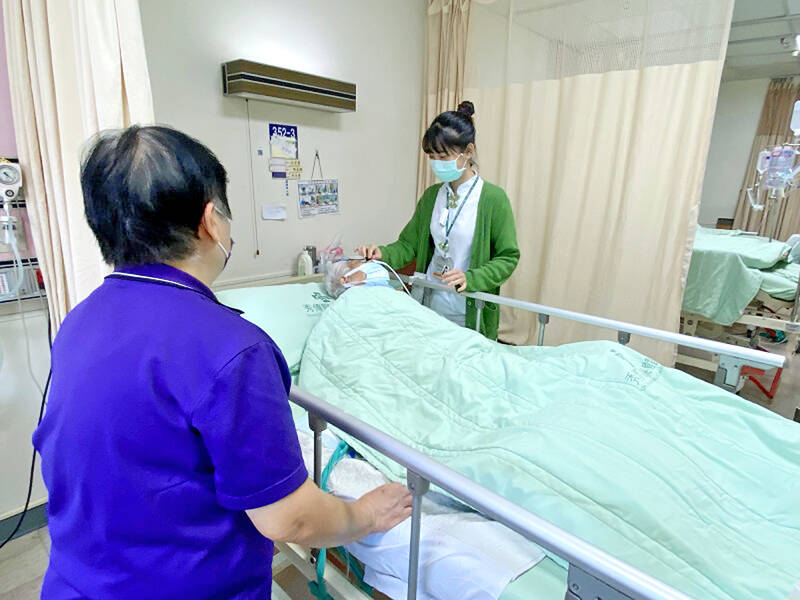The Ministry of Health and Welfare’s trial for integrated healthcare has returned promising results, prompting the National Health Insurance Administration (NHIA) to announce the inclusion of 44 more hospitals.
The program hopes to alleviate the physical, mental and financial burdens of people who must care for hospitalized family members.
Hospitals under the program provide personnel to care for patients, who would be placed in rooms based on the severity of their illness, while the costs are split between the National Health Insurance (NHI) and the patient.

Photo courtesy of Tainan Municipal Hospital
All personnel participating in the program should have proper certification, provide credentials proving that they have graduated from vocational high schools with a nursing program, and retain ministry-awarded and approved hospital healthcare training certification.
Hospitals are authorized to hire additional staff, or subcontract to cooperatives or labor dispatch firms to provide personnel for the program, NHIA Department of Medical Affairs Director Liu Lin-yi (劉林義) said.
The NHI awarded 750 points — with each point equivalent to NT$1 (US$0.03) — for personnel fees, Liu said, adding that the funds came from a special project.
Personnel costs would pay for what the patient should shoulder, but with a ceiling of NT$1,050 per day, he said.
The program began its trial period with NT$300 million last year, with 40 hospitals and 2,847 beds provided, he said.
The program is to receive NT$560 million this year, he added.
Of the 106 hospitals that have expressed intent to participate in the program, the NHIA has approved 84 — including the 40 hospitals previously in the program — with a total of 4,414 beds, Liu said.
The program has been well received by all sectors, as patients said family members were less stressed and the healthcare quality has improved, he said.
Healthcare workers also approve of the system, as it has lessened their workload, including overtime, he said, adding that hospitals also benefited as the program prevented them from losing workers.

SHIPS, TRAINS AND AUTOMOBILES: The ministry has announced changes to varied transportation industries taking effect soon, with a number of effects for passengers Beginning next month, the post office is canceling signature upon delivery and written inquiry services for international registered small packets in accordance with the new policy of the Universal Postal Union, the Ministry of Transportation and Communications said yesterday. The new policy does not apply to packets that are to be delivered to China, the ministry said. Senders of international registered small packets would receive a NT$10 rebate on postage if the packets are sent from Jan. 1 to March 31, it added. The ministry said that three other policies are also scheduled to take effect next month. International cruise ship operators

NUMBERS IMBALANCE: More than 4 million Taiwanese have visited China this year, while only about half a million Chinese have visited here Beijing has yet to respond to Taiwan’s requests for negotiation over matters related to the recovery of cross-strait tourism, the Tourism Administration said yesterday. Taiwan’s tourism authority issued the statement after Chinese-language daily the China Times reported yesterday that the government’s policy of banning group tours to China does not stop Taiwanese from visiting the country. As of October, more than 4.2 million had traveled to China this year, exceeding last year. Beijing estimated the number of Taiwanese tourists in China could reach 4.5 million this year. By contrast, only 500,000 Chinese tourists are expected in Taiwan, the report said. The report

Temperatures are forecast to drop steadily as a continental cold air mass moves across Taiwan, with some areas also likely to see heavy rainfall, the Central Weather Administration (CWA) said. From today through early tomorrow, a cold air mass would keep temperatures low across central and northern Taiwan, and the eastern half of Taiwan proper, with isolated brief showers forecast along Keelung’s north coast, Taipei and New Taipei City’s mountainous areas and eastern Taiwan, it said. Lows of 11°C to 15°C are forecast in central and northern Taiwan, Yilan County, and the outlying Kinmen and Lienchiang (Matsu) counties, and 14°C to 17°C

STEERING FAILURE: The first boat of its class is experiencing teething issues as it readies for acceptance by the navy, according to a recent story about rudder failure The Hai Kun (海鯤), the nation’s first locally built submarine, allegedly suffered a total failure of stern hydraulic systems during the second round of sea acceptance trials on June 26, and sailors were forced to manually operate the X-rudder to turn the submarine and return to port, news Web site Mirror Daily reported yesterday. The report said that tugboats following the Hai Kun assisted the submarine in avoiding collisions with other ships due to the X-rudder malfunctioning. At the time of the report, the submarine had completed its trials and was scheduled to begin diving and surfacing tests in shallow areas. The X-rudder,